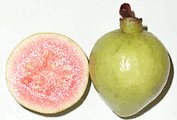Health Benefits of Guava Fruit
Guava is another tropical fruit rich in high-profile nutrients. With its unique flavor, taste, and health-promoting qualities, the fruit easily fits into the category of new functional foods, often labelled as “super-fruits.”
It is an evergreen, tropical shrub or low-growing small tree probably originated in the central Americas. Guavas actually thrive well under both humid and dry climates and can tolerate brief periods of cold spells, but can only withstand a few degrees of frost. Its adaptability into ranging emvironments makes it a favorite commercial crop in some tropical
areas.
Botanically, this wonderful fruit belongs within the family of Myrtaceae, in the genus: Psidium.
Scientific name: Psidium guajava.

Red varieties are indeed rich in carotenes and lycopene.
During each season, a guava tree bears numerous round, ovoid or pear-shaped fruits, each about 5-10 cm long and weigh around 50–200 g. Different cultivar types of guava grown all over the world which may vary widely in flavor, pulp color, and seed composition.
The fruit is soft when ripe with sweet musky aroma and creamy texture flesh. Internally, its flesh varies in color depending up on the cultivar and may be white, pink, yellow, or red. Ripe fruits have rich flavor with sweet-tart taste. Each fruit contains numerous tiny, semi-hard edible seeds, concentrated especially at its center.
The fruit is very rich source of soluble dietary fiber (5.4 g per 100 g of fruit, about 14% of DRA), which makes it a good bulk laxative. The fiber content helps protect the colon mucous membrane by decreasing exposure time to toxins as well as binding to cancer-causing chemicals in the colon.
Guava-fruit is an excellent source of antioxidant vitamin-C . 100 g fresh fruit provides 228 mg of this vitamin, more than three times the required DRI (daily-recommended intake). Flesh just underneath its outer thick rind contains exceptionally higher levels of vitamin C than its inner creamy pulp.
Scientific studies suggest that regular consumption of fruits rich in vitamin C
helps human body develop resistance against infectious agents and scavenge cancer causing harmful free radicals from the body. Further, it is required for collagen synthesis within the body. Collagen is one of the chief structural protein in the human body required for maintaining integrity of blood vessels, skin, organs, and bones.
The fruit is a very good source of Vitamin-A, and flavonoids like beta-carotene, lycopene , lutein and cryptoxanthin. The compounds are known to have antioxidant properties and therefore essential for optimum health. Further, vitamin-A is also required for maintaining healthy mucusa and skin. Consumption of natural fruits rich in carotene is known to protect from lung and oral cavity cancers.
100 g of pink guava fruit provides 5204 µg of lycopene, nearly twice the amount than in tomatoes. (100 g tomato contains 2573 µg of lycopene). Studies suggest that lycopene in pink guavas prevents skin damage from UV rays and offer protection from prostate cancer.
Fresh fruit is a very rich source of potassium. It contains more potassium than other fruits like banana weight per weight. Potassium is an important component of cell and body fluids that helps controlling heart rate and blood pressure.
Further, the fruit is also a moderate source of B-complex vitamins such as pantothenic acid, niacin, vitamin-B6 (pyridoxine), vitamin E and K, as well as minerals like magnesium, copper, and manganese.
Manganese is used by the body as a co- factor for the antioxidant enzyme, superoxide dismutase . Copper is required for the production of red blood cells.
Stay entertained, Stay entertained with the right informations, & Share what you know.
It is an evergreen, tropical shrub or low-growing small tree probably originated in the central Americas. Guavas actually thrive well under both humid and dry climates and can tolerate brief periods of cold spells, but can only withstand a few degrees of frost. Its adaptability into ranging emvironments makes it a favorite commercial crop in some tropical
areas.
Botanically, this wonderful fruit belongs within the family of Myrtaceae, in the genus: Psidium.
Scientific name: Psidium guajava.

Red varieties are indeed rich in carotenes and lycopene.
During each season, a guava tree bears numerous round, ovoid or pear-shaped fruits, each about 5-10 cm long and weigh around 50–200 g. Different cultivar types of guava grown all over the world which may vary widely in flavor, pulp color, and seed composition.
The fruit is soft when ripe with sweet musky aroma and creamy texture flesh. Internally, its flesh varies in color depending up on the cultivar and may be white, pink, yellow, or red. Ripe fruits have rich flavor with sweet-tart taste. Each fruit contains numerous tiny, semi-hard edible seeds, concentrated especially at its center.
Health benefits of guava fruit
Guava is low in calories and fats but carry several vital vitamins, minerals, and antioxidant poly-phenolic and flavonoid compounds that play a pivotal role in the prevention of cancers, aging, infections, etc.The fruit is very rich source of soluble dietary fiber (5.4 g per 100 g of fruit, about 14% of DRA), which makes it a good bulk laxative. The fiber content helps protect the colon mucous membrane by decreasing exposure time to toxins as well as binding to cancer-causing chemicals in the colon.
Guava-fruit is an excellent source of antioxidant vitamin-C . 100 g fresh fruit provides 228 mg of this vitamin, more than three times the required DRI (daily-recommended intake). Flesh just underneath its outer thick rind contains exceptionally higher levels of vitamin C than its inner creamy pulp.
Scientific studies suggest that regular consumption of fruits rich in vitamin C
helps human body develop resistance against infectious agents and scavenge cancer causing harmful free radicals from the body. Further, it is required for collagen synthesis within the body. Collagen is one of the chief structural protein in the human body required for maintaining integrity of blood vessels, skin, organs, and bones.
The fruit is a very good source of Vitamin-A, and flavonoids like beta-carotene, lycopene , lutein and cryptoxanthin. The compounds are known to have antioxidant properties and therefore essential for optimum health. Further, vitamin-A is also required for maintaining healthy mucusa and skin. Consumption of natural fruits rich in carotene is known to protect from lung and oral cavity cancers.
100 g of pink guava fruit provides 5204 µg of lycopene, nearly twice the amount than in tomatoes. (100 g tomato contains 2573 µg of lycopene). Studies suggest that lycopene in pink guavas prevents skin damage from UV rays and offer protection from prostate cancer.
Fresh fruit is a very rich source of potassium. It contains more potassium than other fruits like banana weight per weight. Potassium is an important component of cell and body fluids that helps controlling heart rate and blood pressure.
Further, the fruit is also a moderate source of B-complex vitamins such as pantothenic acid, niacin, vitamin-B6 (pyridoxine), vitamin E and K, as well as minerals like magnesium, copper, and manganese.
Manganese is used by the body as a co- factor for the antioxidant enzyme, superoxide dismutase . Copper is required for the production of red blood cells.
Stay entertained, Stay entertained with the right informations, & Share what you know.

0 Response to "Health Benefits of Guava Fruit"
Post a Comment